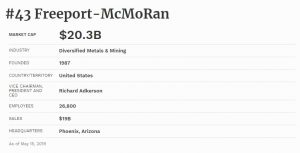Forbes, in partnership with JUST Capital, today released the latest iteration of the JUST 100, a ranking of publicly traded American corporations that are leading the way with regard to the issues that Americans care about the most, including worker pay and treatment, customer respect, environmental impact, community involvement, and ethical and diverse leadership. The rankings provide a comprehensive measurement to determine the best corporate actors and those who prioritize generating positive returns not just for themselves, but for their stakeholders and society.
 “The companies we spotlight on the Forbes JUST 100 List reflect our belief that corporate accountability is critical when creating systemic changes and reimagining capitalism,” said Forbes Chief Content Officer Randall Lane. “These organizations are driving transformative change across industries and leaving a lasting impact on the world.”
“The companies we spotlight on the Forbes JUST 100 List reflect our belief that corporate accountability is critical when creating systemic changes and reimagining capitalism,” said Forbes Chief Content Officer Randall Lane. “These organizations are driving transformative change across industries and leaving a lasting impact on the world.”
Microsoft takes the top spot on the 2020 JUST 100 list, maintaining the No.1 position for the second consecutive year. The company was followed closely by technology and gaming giant Nvidia, who was recognized as No. 2 overall, but first in terms of maintaining the greatest worker treatment of all organizations considered. Apple, who jumped 13 places to third overall, earned the top spot in customer treatment.
To coincide with the launch of the JUST 100 ranking, Forbes, in partnership with JUST Capital, will host a JUST 100 list launch celebration to recognize the 2020 list makers. The event, hosted in partnership with Procter & Gamble, will feature keynote discussions around the urgency to redefine how companies serve their employees, customers, communities and the environment.
For the complete JUST 100 list and features, visit: www.forbes.com/just100.
About Forbes
The defining voice of entrepreneurial capitalism, Forbes champions success by celebrating those who have made it, and those who aspire to make it. Forbes convenes and curates the most-influential leaders and entrepreneurs who are driving change, transforming business and making a significant impact on the world. The Forbes brand today reaches more than 120 million people worldwide through its trusted journalism, signature LIVE events, custom marketing programs and 40 licensed local editions in 70 countries. Forbes Media’s brand extensions include real estate, education and financial services license agreements. For more information, visit: ForbesMedia.com.
Media Contact:
Jocelyn Swift: jswift@forbes.com, 212.367.3172
Everything and anything you need to know about Forbes, the global media brand that celebrates entrepreneurial capitalism. In this section, you’ll find the latest Forbes press releases and news announcements.
The List
| Rank | Company | Industry | Location |
| 1 | Microsoft | Software | Washington |
| 2 | NVIDIA | Semiconductors & Equipment | California |
| 3 | Apple | Technology Hardware & Equipment | California |
| 4 | Intel | Semiconductors & Equipment | California |
| 5 | Salesforce.com | Software | California |
| 6 | Alphabet | Internet | California |
| 7 | Anthem | Health Care Providers | Indiana |
| 8 | PayPal | Commercial Support Services | California |
| 9 | Procter & Gamble | Personal Products | Ohio |
| 10 | VMware | Software | California |
| 43 | Freeport-McMoRan Inc. | Basic Resources | Arizona |
Industry: Basic Resources
| Rank | Company | Overall Rank |
| 1 | Freeport-McMoRan Inc. | 43 |
| 2 | Newmont Mining Corp. | 208 |
| 3 | Alcoa Corporation | 346 |
| 4 | International Paper Co. | 375 |
| 5 | Domtar Corp. | 453 |
| 6 | Southern Copper Corporation | 455 |
| 7 | Steel Dynamics Inc. | 484 |
| 8 | Nucor Corporation | 504 |
| 9 | Reliance Steel & Aluminum Co. | 696 |
| 10 | United States Steel Corporation | 769 |
| 11 | Royal Gold Inc. | Bottom 10% |
Full Ranking Methodology
Below, please find the Executive Summary and top-line details from our 2020 Methodology. For a complete overview of our processes, please view our Full Ranking Methodology.
Executive Summary
Every year, we ask the American public to identify what actions companies should take to be more just and prioritize the issues that matter to them most. Those issues become the foundation by which we annually evaluate and track companies. This analysis powers everything we do to incentivize corporate change – from the Rankings of America’s Most JUST Companies and ongoing thematic analysis to products like the JUST ETF.
Our Methodology provides a detailed look at how JUST Capital calculated the Rankings of America’s Most JUST Companies for 2020. Since 2016, JUST Capital has ranked the largest, publicly traded U.S. corporations, producing a list that reflects how well each company measures up against the American public’s definition of just business behavior. JUST Capital released its inaugural industry-level ranking in 2016. In 2017, we released our first ever overall ranking of companies, comparing companies across different industries. Over the past two years, we have continued to build upon this foundation, bringing more data collection in house, refining our measures and methodologies, and engaging with more companies on their journey to practicing more just corporate behavior.
As part of the development of this methodology and our annual rankings, we solicited input from both the American public and subject matter experts – such as academics, investment practitioners, and corporations – on our choice of measurements and our means of transforming the raw data to use in our ranking model. These checks and balances have been critical to ensuring that our work and our rankings remain as informed, objective, and accurate as possible.
Our Process
To produce the annual Rankings of America’s Most JUST Companies, our methodology follows a four-step process:
Survey Research: JUST Capital conducts both qualitative focus groups and quantitative surveys with a representative sample of the American public on a regular basis in order to understand what issues represent just corporate behavior, how these issues should be defined, and what their relative importance or weight is.
Company Evaluation: In as fair, unbiased, and rigorous way as possible, JUST Capital develops metrics and collects data on how companies in the Russell 1000 Index – the largest, publicly traded U.S. companies – perform across these issues. These data are used in developing each company’s score and rank.
Company Data Review: After JUST Capital collects the data for each of the companies in the Russell 1000 universe, companies are given the opportunity to review their data and submit suggestions for revisions before company scores and ranks are determined.
Rankings: As a final step, JUST Capital develops a ranking model that leverages our survey research and company evaluations to score and finally rank companies from the Russell 1000 Index. We generate an overall ranking of companies in the Russell 1000 universe as well as an industry-level ranking so that companies can be compared to their peers.
Survey Research
JUST Capital’s survey research consists of both qualitative and quantitative work, in the form of focus groups and surveys, that have been conducted over the past four years in order to develop a framework for our ranking model. We have surveyed over 96,000 Americans – representative of the adult U.S. population – since 2015, adding more than 15,000 respondents in 2019 alone.
Our survey research begins with focus groups that are conducted each year across the country to get detailed, unfiltered input from Americans of all backgrounds on what business behaviors should look like at just companies. The findings from the focus groups are used to inform quantitative surveys that confirm the importance of these business behaviors and their relevance to justness. The surveys use a MaxDiff technique, which asks respondents what business behaviors are most and least important to defining a just company and then assigns a weight to each business behavior based on the probability that a member of the American public would choose it as most important.
More details on the results of our 2019 Survey, as well as an in depth Polling Methodology, can be found here.
Company Evaluation
The Issues identified by the American public form the basis for JUST Capital’s evaluation of companies. As a first step in evaluating companies, we develop Metrics, or conceptual measures of corporate performance on each of our 29 Issues. This year there are 94 in the model.
As a second step in JUST Capital’s evaluation of companies, our analysts determine appropriate Data Points that can be used to calculate the Metrics on company performance. These Data Points are highly granular and each year, analysts collect them from a variety of reliable sources, such as company filings and other public documents, third-party data vendors, and national media and press.
In 2019, JUST Capital collected 148 Data Points – and many Sub-Data Points – o calculate the Metrics on companies’ just behaviors. Data Points are collected for our entire universe of ranked companies, which is roughly equivalent to the 1,000 largest, publicly traded U.S. companies as defined by the Russell 1000 Index. We specifically exclude companies that we cannot subject to common standards of measurement due to data unavailability and companies that have been acquired. As a result, we evaluated and ranked 922 companies from the Russell 1000 Index across 33 industries in 2019.
Company Data Review
Once the Data Points have been collected, JUST Capital provides each ranked company with an opportunity to review its data and submit suggestions for revisions. Over the course of six weeks, representatives from each of the companies we rank are invited to review their data on the JUST Capital Corporate Portal, a secure, web-based comment platform. JUST Capital analysts assess each suggestion submitted by the companies to ensure that all data are accurate, relevant, and consistent with our metrics and methodology and are publicly disclosed.
Rankings
The fourth and final step of JUST Capital’s methodological approach is producing a cross-industry ordinal rank of each company in our universe.
To construct the rankings, JUST Capital calculates a series of Metric scores from Data Points and then, averages these Metrics to get scores at the Issue level. In select cases where companies do not have the underlying Data Points needed to compute a Metric Score, we apply a missing data treatment. Data Points are further normalized to account for variations in company size and scale. To account for other cases where a company’s Data Point value or Metric score appears to be an outlier, we winsorize or cap its Issue level score. A company’s overall score is then determined by calculating the sum of its scores across all Issues, weighted by each Issue’s importance as derived from the MaxDiff survey results. The overall score directly relates to a company’s rank, where a higher overall score results in a higher rank.
In addition to producing an ordinal rank of each company in our universe, JUST Capital also generates an industry-specific rank. A company’s industry-specific rank is obtained by comparing a company’s overall rank to other companies within its industry. Companies with a higher cross-industry rank are ranked higher in the industry-specific rankings.
For more in-depth detail on JUST Capital’s 2020 Rankings methodology, please see our full methodology.
